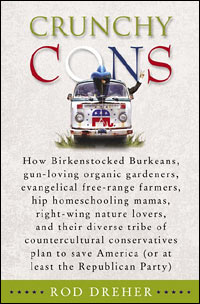Alex and I shop at Whole Foods. We value the traditional family. We love independent bookstores. We generally vote Republican. We buy local honey. We are strongly pro-life. We enjoy catching the First Friday Gallery Hop. We are concerned about our culture's moral condition. We listen to NPR.
Occasionally, when I mention Whole Foods, the Gallery Hop, or NPR around some of my staunch Republican, dyed-in-the-wool conservative friends, they look as me wih suspicion as if to ask, "Are you going liberal on us?" Then when I talk about traditional parenting roles or preserving the morality that is taught in the Bible, my more liberal friends look at me as if I have just arrived from the Stone Age.
Well, I think I've finally found some folks who stand on common ground. Yeserday, Alex and I were listening to a commentary on
NPR's "All Things Considered" about Crunchy Conservatives. As we listened, we looked at each other, silently agreeing that we resonated with these ideas.
So what is a crunchy conservative?
Rod Dreher, a conservative writer and editor at the Dallas Morning News, has written a book called
Crunchy Cons: How Birkenstock Burkeans, gun-loving organic gardeners, evangelical free-range farmers, hip homeschooling mamas, right-wing nature lovers, and their diverse tribe of countercultural conservatives plan to save America (or at least the Republican Party), which seeks to explain the idea of crunchy conservativism. "Crunchy cons prefer old houses and mom-and-pop shops to McMansions and strip malls... Many of us homeschool our kids, and cheerfully embrace nonconformity. I read Edmund Burke and wear Birkenstock sandals. Go figure."

Dreher has even formed A Crunchy Con Manifesto:
1. We are conservatives who stand outside the conservative mainstream; therefore, we can see things that matter more clearly.
2. Modern conservatism has become too focused on money, power, and the accumulation of stuff, and insufficiently concerned with the content of our individual and social character.
3. Big business deserves as much skepticism as big government.
4. Culture is more important than politics and economics.
5. A conservatism that does not practice restraint, humility, and good stewardship—especially of the natural world—is not fundamentally conservative.
6. Small, Local, Old, and Particular are almost always better than Big, Global, New, and Abstract.
7. Beauty is more important than efficiency.
8. The relentlessness of media-driven pop culture deadens our senses to authentic truth, beauty, and wisdom.
9. We share Russell Kirk’s conviction that “the institution most essential to conserve is the family.”
I guess I can sign my name to that...

